A film star for many years from way back in the early fifties actually – and here is a rare interview with her. It was actually a longer version than this but I finished it just before she had success with Born Free
Here below is an extract from an interview she did some time ago which gives an insight into how she got into and flourished in the acting profession :-
I was born in London in 1931. My father was chief auctioneer at Christies and my mother was a wonderful pianist. She was in cabaret act called ‘That Certain Trio’ and they played the Savoy and other high profile venues.
My parents divorced when I was four. I lived with my father and we moved to Slinfold. I actually wrote to the people who now live in my old home and they asked if I would like to come and visit. I went and had coffee with them, walked around the garden and saw where my bedroom was.
I attended Herons Ghyll School near Horsham until the war started. I was boarding at the school and we were in the shelter every night. My father wanted me to be safe so he asked my mother to take me to South Africa. We sailed over and I lived there for six years.
I returned to England and to Herons Ghyll aged 14 and took what was called a Higher Certificate. I was always very interested in writing, reading and literature. I wanted to go to University to read English in order to become a journalist, but I had to earn my money more quickly.
My parents had seen me in school plays and encouraged me to go into acting. I went to an audition at The Old Vic but failed. I was however accepted at the Central School of Speech and Drama, where I satisfied my more academic side by taking a diploma course too.
An agent saw me in one of the school performances and told me he would like to look after me once I left drama school. He found me some work over the school holidays at the Dundee Repertory – a place where many famous actors have started out – Richard Todd springs to mind as one of them – and I absolutely loved it. I felt I was ready to learn out oi the field so I spoke to the Head Mistress and asked if she would allow me to leave a year early. I felt that I was ready. Fortunately, she said ‘yes’.
Today there are so few reps around so people finishing drama school nowadays usually have to start in television, where the technique is completely different from theatre. In theatre, not only do you have to portray your feelings, you have to project them to the front row of the stalls and to the back row of the upper circle. That is a challenge.
Whilst I was at Dundee, playing Estella in Great Expectations, I was watched by Daphne Rye. She was a representative of H.M Tennent, a big London theatre company of the time. They were casting a play called ‘A Penny for a Song’ and thought I would be right for the part of Dorcas. So I left Scotland for the Haymarket Theatre.
I was in some amazing productions with incredible people. H.M Tennent was also putting on A Winter’s Tale with John Gielgud, Dianna Wynyard and Flora Robson, and I went into that and played Perdita. I was very nervous. I remember trembling with fear in the aisles with a young actor, Richard Gale, who played Florizel. I remember John Gielgud came up to us and said ‘You two, what’s the matter?’ We told him we were worried we would not be good enough and he said ‘Nonsense! It will be perfectly fine.’ He gave us a pat on the shoulder and we wondered if someone had done the same for him once. He was the most lovely man.
My first television show was Shout Aloud Salvation, which was a great success. It was live television in those days, so one shoot would take place in one studio and you would literally have to run along the passageways, throwing on a hat or changing as you went, to make it to another studio for the next scene. You can’t stop. If you made a mistake, you had to cover it up.
The Second Mrs Tanqueray, filmed at the Riverside Studios, was my debut film. I don’t think many people have seen that film, which is probably quite good really!
I married Denholm Elliott, who I met on set of The Cruel Sea in 1953. It was a very short marriage. It was not right for either of us, let’s put it like that.
A Town Like Alice was shot over three months in 1956, which was quite long in those days. I never went to Malaya or Australia, as it was all filmed at Pinewood. There are shots of us withered women prisoners in the last stages of decline, all traipsing through a swamp. We actually plodded through a pond in Burnham Beeches. It was freezing cold, so they were spraying glycerine on our faces to make it seem swelteringly hot!
A wonderful actress of the time called Marie Löhr was also in the film. Marie had known my father. She gave me a beautiful locket that he had given to her years before, and I still treasure it.
I won the BAFTA for Best British Actress, and my co-star Peter Finch won the Best Actor award. It was a surprise to me, as everything is always a surprise. You do what you do. You are not thinking of prizes. Awards are quite hyped these days, but it was a little more reserved in those days. I can’t remember what I said!
At one point I did a series of cameos, as I wanted so much to work with the person I would be doing the scene with. They included Kirk Douglas, Gary Cooper and Donald Sutherland. I was so lucky to have that chance of working in that golden era.
I first met Bill Travers in a play called ‘I Captured the Castle’ by Dodie Smith. I was playing Cassandra, and Bill was given a part and we met. But at that time, in 1953, I was about to marry, Bill was married already, and that was the end of that. We didn’t see each other until a good while later when we met by chance. We were having dinner with different people in the same restaurant and saw each other again. We met up then and never stopped meeting up. We married in 1957.
I was always testing myself. That’s life. You have got to take risks.
Sometimes Bill and I were in films together. We made a film together called The Smallest Show on Earth. The cast included Peter Sellers, Leslie Phillips, Margaret Rutherford and Bernard Miles and as it was a comedy we were laughing every five seconds. Leslie and I are the survivors of that film and we are still friends today.
ABOVE – I love this shot and remember it so well. Virginia McKenna gazes at Peter Sellers the projectionis who is totally in love with the films and the magic of the film show. Bill Travers looks on.
I certainly knew someone a few years ago who found that certain something from film shows that Peter Sellers portrayed here.
ABOVE – Virginia McKenna and Bill Travers with Margaret Rutherford
We followed that with The Barretts of Wimpole Street with John Gielgud and Jennifer Jones, then Passionate Summer and Two Living, One Dead. We had masses of work. Bill enjoyed a great personal success with a film called Geordie in the mid-1950s that led to a lot of work for him.
After marrying, we had two children quite quickly before a little gap and then two more children. They would travel with us as we filmed all over the world. When we made Born Free in 1964, three of the children came with us. William was five when we left for Kenya, and he has adored the continent ever since.
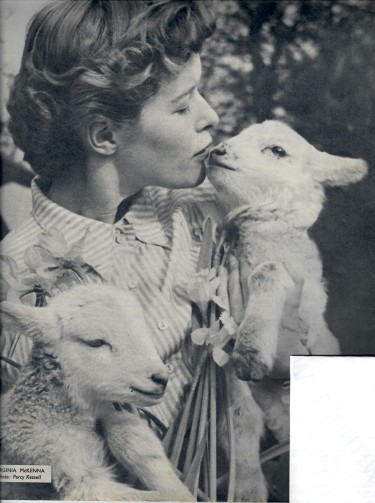
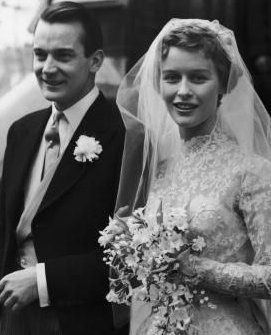
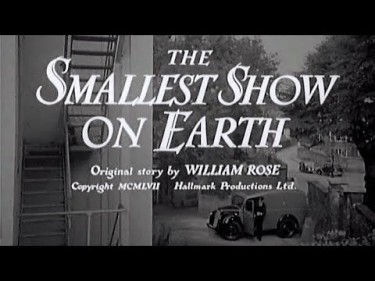
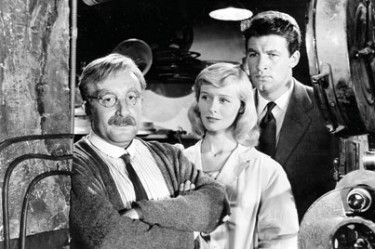
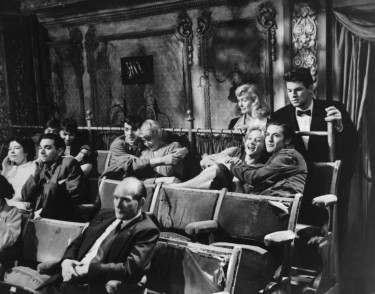
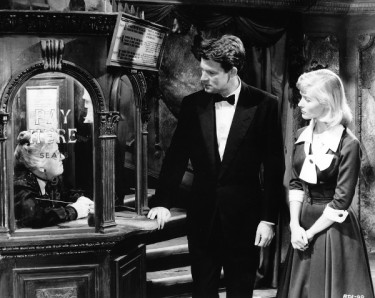
Very interesting, Neil.
Yes. I found it interesting too David. I just copied this piece from an interview she must have given but it does give an insight into her early life. For instance I had no idea that she had lived in South Africa during Wartime. Also when she got back just how quickly her acting career got under way. Neil
A pity that your page is being inundated with spam about Viagra. The problem is that when you delete them, it tends to delete people’s comments as well. My comment about Jack Hawkins disappeared yesterday. But if you turn on the spam filter, it prevents you seeing genuine people’s comments.
David. Thanks. Yes it is a pity that all this Spam appears which I try to get rid of as quickly as I can. Trouble is along with the Spam I have IN ERROR deleted an item you sent as follows : ‘Splendid photos that I’ve never seen before, Neil…although Jack does look a bit out of place sitting in that classroom surrounded by youngsters.’
My response to this is that the pictures I got hold of from one of my many old magazines of the day – and these tend to have pictures that don’t seem to be around now. Jack had gone back to his school, then his first Theatre then his flat and on the way to his home with his wife and young family. I agree he does look like a ‘fish out of water’ in the classroom but I did notice that the schoolboy in front of him did not seem to be daunted at all by his being there. Jack Hawkins would have been 44 or 45 when these pictures were taken in 1955. Neil
I’m glad my comment got saved, Neil. I can imagine the teacher going up to Jack in that classroom photo and asking him what he was doing there at his age and Jack replying “Well, I forgot to leave school”.
David, When you read between the lines of Jack’s life, he certainly hit the ground running – appearing in the West End at the age of 15 and on Broadway at 18.
He lived in Kensington Gardens and had lived before this in Sloane Square – so he must have had something behind him. However as soon as the films came along he would no doubt be quite well off. He had been married to Jessica Tandy for quite a few years before the War. Neil
Thank you for your sharing. I am worried that I lack creative ideas. It is your article that makes me full of hope. Thank you. But, I have a question, can you help me?
… [Trackback]
[…] Read More on that Topic: filmsofthefifties.com/virginia-mckenna/ […]
… [Trackback]
[…] Info to that Topic: filmsofthefifties.com/virginia-mckenna/ […]